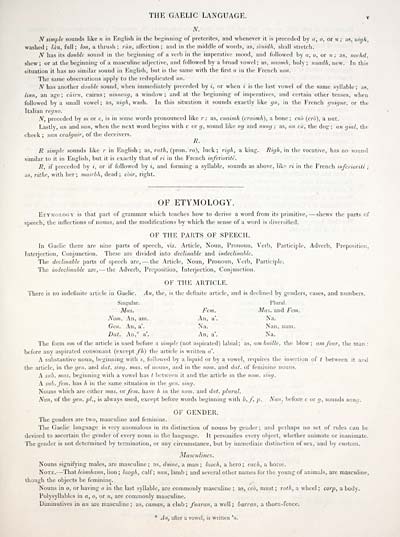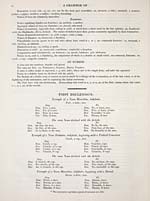Download files
Complete book:
Individual page:
Thumbnail gallery: Grid view | List view

THE GAELIC LANGUAGE. v
N.
N simple sounds like Ji in English in the beginning of preterites, and whenever it is preceded by n, o, or tt ; as, nigh,
washed; Ian, full; Ion, a thrush; run, affection; and in the middle of words, as, s'lnidh, shall stretch.
N has its double sound in the beginning of a verb in the imperativi' mood, and followed by a, o, or u ; as, nochd,
shew ; or at the beginning of a masculine adjective, and followed by a broad vowel ; as, miomh, holy ; nnadh, new. In this
situation it has no similar sound in English, but is the same with the first n in the I^rench non.
The same observations apply to the reduplicated iin.
N has another double sound, when immediately preceded by i, or when i is the last vowel of the same syllable ; as,
linn, an age ; cùirn, cairns ; uinneag, a window ; and at the beginning of imperatives, and certain other tenses, when
followed by a small vowel ; as, nigh, wash. In this situation it sounds exactly like gn, in the French guigne, or the
Italian regno.
N, preceded by m or e, is in some words pronounced like r ; as, cnaimh (craimh), a bone; cnh (era), a nut.
Lastly, an and nan, when the next word begins with c or g, sound like ng and nniig ; as, an ci), the dog ; an gial, the
cheek ; nan cealgair, of the deceivers.
R.
R simjile sounds like r in English ; as, rath, (pron. ra), luck; righ, a king. Righ, in the vocative, has no sound
similar to it in English, but it is exactly that of ?i in the French infeùoiitc.
R, if preceded by i, or if followed by i, and forming a syllable, sounds as above, like ri in the French inferiority ;
as, rithe, with her ; rnairbh, dead ; coir, right.
OF ETYMOLOGY.
Etymology is that part of grammar which teaches how to derive a word from its primitive, — shews the parts of
speech, the inflections of nouns, and the modifications by which the sense of a word is diversified.
OF THE PARTS OF SPEECH.
In Gaelic there are nine parts of speech, viz. Article, Noun, Pronoun, Verb, Participle, Adverb, Preposition,
Interjection, Conjunction. These are divided into declinable and indeclinable.
The declinable parts of speech are, — the Article, Noun, Pronoun, Verb, Participle.
The indeclinable are, — the Adverb, Preposition, Interjection, Conjunction.
OF THE ARTICLE.
There is no indefinite article in Gaelic. An, the, is the definite article, and is declined by genders, cases, and numbers.
Singular. Plural.
Mas.
Norn. An, am.
Gen. An, a'.
Dat. An,* a'.
The form am of the article is used before a simple (not aspirated) labial; as, am bailie, the blow ; am fear, the man :
before any aspirated consonant (except fli) the article is written a'.
A substantive noun, beginning with s, followed by a liquid or by a vowel, requires the insertion of t between it and
the article, in the gen. and dat. sing. mas. of nouns, and in the iiom. and dat. of feminine nouns.
A sub. mas. beginning with a vowel has t between it and the article in the nom. sing.
A sub. fern, has h in the same situation in the gen. sing.
Nouns which are either mas. or fern, have h in the worn, and dat. plural.
Nan, of the gen. pi., is always used, except before words beginning with b,f, p. Nan, before c or g, sounds nang.
OF GENDER.
The genders are two, masculine and feminine.
The Gaelic language is very anomalous in its distinction of nouns by gender; and perhaps no set of rules can be
devised to ascertain the gender of every noun in the language. It personifies every object, whether animate or inanimate.
The gender is not determined by tennination, or any circumstance, but by immediate distinction of sex, and by custom.
Mascitliiies.
Nouns signifying males, are masculine ; as, duine, a man ; laoch, a hero ; each, a horse.
Note. — That leomhann, lion; laogh, calf; uan, lamb ; and several other names for the young of animals, are masculine,
though the objects be feminine.
Nouns in o, or having o in the last syllable, are commonly masculine ; as, ceo, must ; rotli, a wheel ; corp, a body.
Polysyllables in a, o, or ti, are commonly masculine.
Diminutives in an are masculine; as, caman, a club; fuaran, a well; barran, u thorn-fence.
" All, after a vowel, is written Vi.
N.
N simple sounds like Ji in English in the beginning of preterites, and whenever it is preceded by n, o, or tt ; as, nigh,
washed; Ian, full; Ion, a thrush; run, affection; and in the middle of words, as, s'lnidh, shall stretch.
N has its double sound in the beginning of a verb in the imperativi' mood, and followed by a, o, or u ; as, nochd,
shew ; or at the beginning of a masculine adjective, and followed by a broad vowel ; as, miomh, holy ; nnadh, new. In this
situation it has no similar sound in English, but is the same with the first n in the I^rench non.
The same observations apply to the reduplicated iin.
N has another double sound, when immediately preceded by i, or when i is the last vowel of the same syllable ; as,
linn, an age ; cùirn, cairns ; uinneag, a window ; and at the beginning of imperatives, and certain other tenses, when
followed by a small vowel ; as, nigh, wash. In this situation it sounds exactly like gn, in the French guigne, or the
Italian regno.
N, preceded by m or e, is in some words pronounced like r ; as, cnaimh (craimh), a bone; cnh (era), a nut.
Lastly, an and nan, when the next word begins with c or g, sound like ng and nniig ; as, an ci), the dog ; an gial, the
cheek ; nan cealgair, of the deceivers.
R.
R simjile sounds like r in English ; as, rath, (pron. ra), luck; righ, a king. Righ, in the vocative, has no sound
similar to it in English, but it is exactly that of ?i in the French infeùoiitc.
R, if preceded by i, or if followed by i, and forming a syllable, sounds as above, like ri in the French inferiority ;
as, rithe, with her ; rnairbh, dead ; coir, right.
OF ETYMOLOGY.
Etymology is that part of grammar which teaches how to derive a word from its primitive, — shews the parts of
speech, the inflections of nouns, and the modifications by which the sense of a word is diversified.
OF THE PARTS OF SPEECH.
In Gaelic there are nine parts of speech, viz. Article, Noun, Pronoun, Verb, Participle, Adverb, Preposition,
Interjection, Conjunction. These are divided into declinable and indeclinable.
The declinable parts of speech are, — the Article, Noun, Pronoun, Verb, Participle.
The indeclinable are, — the Adverb, Preposition, Interjection, Conjunction.
OF THE ARTICLE.
There is no indefinite article in Gaelic. An, the, is the definite article, and is declined by genders, cases, and numbers.
Singular. Plural.
Mas.
Norn. An, am.
Gen. An, a'.
Dat. An,* a'.
The form am of the article is used before a simple (not aspirated) labial; as, am bailie, the blow ; am fear, the man :
before any aspirated consonant (except fli) the article is written a'.
A substantive noun, beginning with s, followed by a liquid or by a vowel, requires the insertion of t between it and
the article, in the gen. and dat. sing. mas. of nouns, and in the iiom. and dat. of feminine nouns.
A sub. mas. beginning with a vowel has t between it and the article in the nom. sing.
A sub. fern, has h in the same situation in the gen. sing.
Nouns which are either mas. or fern, have h in the worn, and dat. plural.
Nan, of the gen. pi., is always used, except before words beginning with b,f, p. Nan, before c or g, sounds nang.
OF GENDER.
The genders are two, masculine and feminine.
The Gaelic language is very anomalous in its distinction of nouns by gender; and perhaps no set of rules can be
devised to ascertain the gender of every noun in the language. It personifies every object, whether animate or inanimate.
The gender is not determined by tennination, or any circumstance, but by immediate distinction of sex, and by custom.
Mascitliiies.
Nouns signifying males, are masculine ; as, duine, a man ; laoch, a hero ; each, a horse.
Note. — That leomhann, lion; laogh, calf; uan, lamb ; and several other names for the young of animals, are masculine,
though the objects be feminine.
Nouns in o, or having o in the last syllable, are commonly masculine ; as, ceo, must ; rotli, a wheel ; corp, a body.
Polysyllables in a, o, or ti, are commonly masculine.
Diminutives in an are masculine; as, caman, a club; fuaran, a well; barran, u thorn-fence.
" All, after a vowel, is written Vi.
Set display mode to: Large image | Transcription
Images and transcriptions on this page, including medium image downloads, may be used under the Creative Commons Attribution 4.0 International Licence unless otherwise stated. ![]()
| Early Gaelic Book Collections > Blair Collection > Gaelic dictionary, in two parts > (27) |
|---|
| Permanent URL | https://digital.nls.uk/79284473 |
|---|
| Description | A selection of books from a collection of more than 500 titles, mostly on religious and literary topics. Also includes some material dealing with other Celtic languages and societies. Collection created towards the end of the 19th century by Lady Evelyn Stewart Murray. |
|---|
| Description | Selected items from five 'Special and Named Printed Collections'. Includes books in Gaelic and other Celtic languages, works about the Gaels, their languages, literature, culture and history. |
|---|

